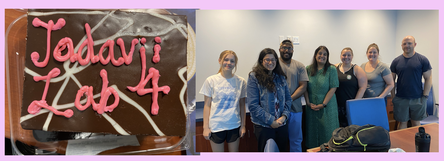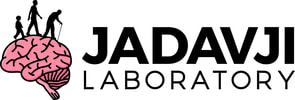 The Jadavji Laboratory is 4 years old! There sure has been a lot going on, but we are happy to celebrate our accomplishments and reflect on what worked and what can be improved in the coming years. So, this blog post will contain some bragging, but also thoughtful reflection. We have trained over 29 students in the lab! Wow, I can’t believe it myself. The students include 1 high school, 3 undergraduates, 3 Masters of Biomedical Sciences, 6 veterinary, 13 medical, 2 pharmacy, and 3 dental students. These students have contributed to research projects and helped me develop my mentoring/supervising skills. We have published 11 papers (6 data papers and 5 review articles) and below is a list of all our students and their publications. Most days I feel like I am the rate limiting step for getting papers out the door, but I think we have done well for being a new lab during a global pandemic. Our grant game has been on fire, I have applied for 19 grants – definitively honing in on my grantmanship skills! We have obtained $456,435 (extramural) and $8510 (intramural) in funding during the past 4 years, which I am very proud of. I am still developing my grant writing skills and was happy to take part of the Utah NRMN Grant Writing Coaching Groups Study. We also had a junior member of the lab arrive in October 2021; he is an absolute bundle of joy and will be 2 soon! Things that I think have worked well since starting an independent research group include writing a lab manual which includes details for safety training and expectations of myself and students – I think this is a good resource for me and students. I have learned a lot about mentoring and supervising students. Through advice from the Twitterverse, I have set up a lab mentoring survey which has helped me obtain a lot of information on what works well and what does not. Another success is keeping notes from all meetings, everything is electronic (Word documents, Google docs, or Apple Notes); these are helpful to keep track of experimental plans, goals, planning, etc. I have also continued to build my community, this is essential for anyone in science, but I think vital for a new parent, PI, and women in academia. I have written about building a community before, here is a link to the post. Things I am still working on include taking it slow, being an academic researcher is not a sprint, but a marathon. It is important to leave time to polish off grants, manuscripts, etc. and not have too much going on. As a postdoc I was able to do many things at once, but with more responsibilities I am learning I cannot do this. I think it is important to reflect on what is working and not working, so every 6 months I try to schedule strategic planning for my lab, which includes updating projects and lots of long-term planning. I have learned as PI you are not only a scientist but HR, psychologist, etc. I am working on developing my leadership skills in my laboratory and my profession through different venues. This year I completed the American Society of Nutrition 2022 Nutrition Leadership Academy and the Research Leadership Program. The past four years have been challenging in so many ways and I have been pushed, but I have also grown and adapted – all of which I am proud of! Every day, I enjoy working with motivated students and colleagues and I am excited to see what happens next! Jadavji Lab Student Publications Hurley L, Jauhal J, Ille S, Pull K, Malysheva OV, Jadavji NM. (2023) Maternal dietary deficiencies in one-carbon metabolism during early neurodevelopment result in larger damage volume, reduced neurodegeneration and neuroinflammation and changes in choline metabolites after ischemic stroke in middle-aged offspring. Nutrients. 15:1556 (Invited) Veterinary Students: Lauren Hurley Master’s Biomedical Science student: Jesse Jauhal Dental Studyent: Sharadyn Ille Yahn GB, Wasek B, Bottiglieri T, Malysheva O, Caudill MA, Jadavji NM. (2023) A dietary vitamin B12 deficiency impairs motor function and changes neuronal survival and choline metabolism after ischemic stroke to the sensorimotor cortex in middle aged male and female mice. Nutritional Neuroscience, In Press https://doi.org/10.1080/1028415X.2023.2188639. Master’s in Biomedical Science student: Gyllian Yahn Clementson M, Hurley L, Coonrod S, Bennett C, Marella P, Pascual AS, Pull K, Wasek B, Bottiglieri T, Malysheva O, Caudill M, Jadavji NM. (2023) Maternal dietary deficiencies in folates or choline during pregnancy and lactation worsen stroke outcome in 3-month-old male and female mouse offspring, Neural Regeneration Research. 18:2443-2448 Medical students: McCoy Clementson, Calli Bennett, Purvaja Marella Veterinary Students: Lauren Hurley Clementson M, Jauhal J, Jadavji NM (2023) Dietary B-vitamins deficiencies and maternal over supplementation on neurodevelopment: an updated narrative. Vitamins and Minerals in Neurological Disorders. Editor: Colin Martin, Vinood Patel, and Victor Preedy. Elsevier. (invited). Medical student: McCoy Clementson Master’s Biomedical Science student: Jesse Jauhal Virdi S, Jadavji NM* The impact of maternal folates on brain development and function after birth. Metabolites 12(9): 876 (Invited). Medical student: Sapna Virdi Poole J, Jasbi J, Pascual AS, North S, Kwatra N, Weissig V, Gu H, Bottiglieri T, Jadavji NM.(2022) Ischemic stroke and dietary vitamin B12 deficiency in old-aged females impaired motor function, increased ischemic damage size, andchanged metabolite profiles in brain and cecum tissue. Nutrients, 14(14), 2960; https://doi.org/10.3390/nu14142960. Medical students: Joshua Poole; Sean North Dental student: Neha Kwatra Marella P, Yahn GB, Kang J, Jadavji NM. (2022) The impact of homocysteine on ischemic stroke and dementia: an updated review of clinical studies and mechanisms in Advances in Health and Disease. Nova Science Publishers Inc. Medical students: Purvaja Marella, Jeminin Kang Dental student: Gyllian Yahn Bennett C, Green J, Ciancio M, Goral J, Pitstick L, Pytynia M, Meyer A, Kwatra N, Jadavji NM. (2021) Dietary folic acid deficiency impacts hippocampal morphology and cortical acetylcholine metabolism in adult male and female mice. Nutritional Neuroscience: In Press. DOI: 10.1080/1028415X.2021.1932242. PMID: 34042561. Medical student: Calli Bennett Dental student: Neha Kwatra GB, Leoncio J, Jadavji NM* (2021)The role of dietary supplementation of one-carbon metabolism on stroke outcome. Current Opinion in Clinical Nutrition and Metabolic Care: doi: 10.1097/MCO.0000000000000743. PMID: 33631772. Master’s in Biomedical Science student: Gyllian Yahn Pharmacy Student: Jeannine Leoncio Yahn GB, Abato JE, Jadavji NM. (2021) Role of vitamin B12 deficiency in ischemic stroke risk and outcome. Neural Regen Res.16(3):470-474. PMID: 32985467. PMCID: PMC79986019. Master’s in Biomedical Science student: Gyllian Yahn Veterinary student: Jamie Abato Burgess K, Bennett C, Mosnier H, Kwatra N, Bethel B, Jadavji NM*. The antioxidant role of one-carbon metabolism on stroke. Antioxidants. 9):1141 PMID: 33212887. PMCID: PMC7698340. (invited) Medical Students: Callie Bennett, Forrest Bethel Veterinary Students: Kassidy Burgess Dental Student: Neha Kwatra Undergraduate Student: Hannah Mosnier Abato JE, Moftah M, Cron GO, Smith PD, Jadavji NM. (2020) Methylenetetrahydrofolate reductase deficiency alters cellular response after ischemic stroke in male mice. Nutritional Neuroscience. 25:558-566. PMID: 32448097. Veterinary student: Jamie Abato
1 Comment
1/19/2024 04:03:45 am
How has the creation of a lab manual and the implementation of a lab mentoring survey contributed to the success of the independent research group, and what insights have been gained through these initiatives? regard <a href="https://it.telkomuniversity.ac.id/">Telkom University</a>
Reply
Leave a Reply. |
Archives
December 2023
Categories |

 RSS Feed
RSS Feed